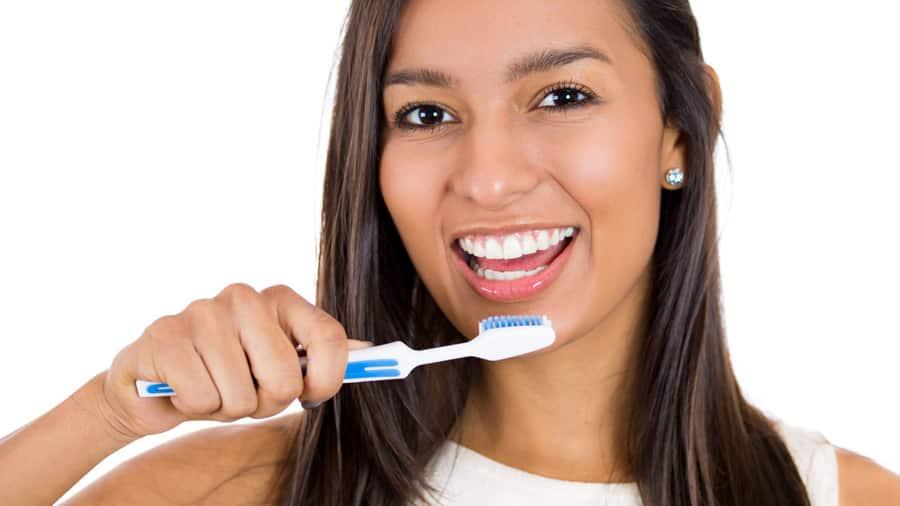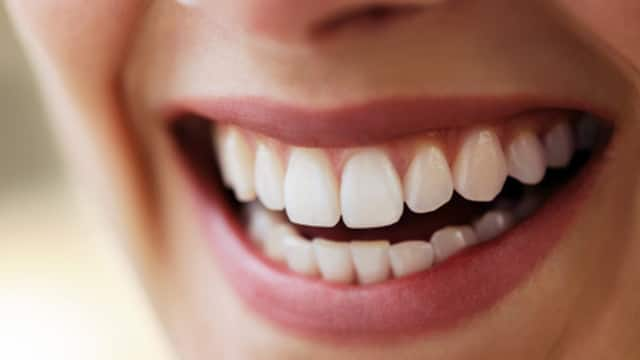Why Do Teeth Turn Yellow?
Tooth enamel, the protective outer layer of our teeth contains microscopic pores that allow pigments to become trapped, leading to discolouration over time. This can cause teeth to appear dull, yellow, or even brown as the enamel stains and discolours. Additionally, as enamel naturally thins and becomes more transparent with age, the yellowish layer of dentin underneath becomes more visible, contributing to an overall yellowing effect.
Get rid of yellow teeth and reveal the real white smile with Colgate Visible White.
Common Causes for Yellowing or Discolouration of Teeth
1. Poor Oral Hygiene
Failing to brush and floss regularly allows a sticky plaque to continually build up on the teeth. As plaque remains on the teeth, it hardens into calcified deposits called tartar. Both plaque buildup and tartar trap stain particles from food as well as waste products from bacteria, allowing teeth staining and discolouration to set in. Maintaining a good oral hygiene routine like brushing everyday, twice a day, with the right toothpaste and toothbrush, using a mouthwash and flossing can help remove the yellow stains and waste deposits.
2. Pigmented Foods & Drinks
Certain pigmented foods could be a cause of tooth discolouration and yellowing of teeth due to acids that can potentially stain teeth or erode the enamel. Coffee and tea are two of the most common, everyday foods that can cause stains, but white and red wine can also contribute to yellowing of teeth. Other culprits include dark and light sodas or sports drinks with artificial flavouring. Long term uses of pigmented drinks without adequate oral hygiene are often associated with yellowish teeth.
3. Smoking
Nicotine from smoking not just develops an unhealthy addiction; it leaves yellowish or brownish surface stains on your teeth, too (one more reason to kick the habit!). Consistent smoking results in darker teeth with stubborn yellow stains that can penetrate deep into the enamel.
4. Genetics & Other Natural Factors
Sometimes, discolouration of teeth runs in the family. If one of the parents' teeth are yellowish, yours are likely to have a similar hue. Reddish brown, reddish yellow, grey and reddish grey are the four natural shades of otherwise white teeth, and this depth of colour varies across a spectrum from light to dark.
Additionally, it could depend on the natural colour of your teeth. Dentin is a deep yellow to brownish material under the protective layer - called enamel. When the enamel is thin, the dentin underneath is more visible and teeth can appear yellow. The natural colour of the dentin below your enamel and thickness of your enamel can vary between people.
Further, teeth can seem more yellow with age. This is because of everyday wear and tear of enamel. As people age, enamel wears away from regular chewing and exposure to acidic foods.
5. Antibiotics
Antibiotics can have notable effects on dental health, particularly when used extensively or during critical periods of tooth development. Some antibiotics may disrupt the balance of oral microbiota, potentially leading to oral thrush or other dental issues.
According to a research study published in the Journal of Pharmacy and Technology, tetracycline antibiotics can stain teeth. Tetracycline and oxytetracycline cause a yellow discoloration, whereas chlortetracycline produces a grey-brown discoloration. Evidence suggests that, of all the Tetracyclines, oxytetracycline is categorised as a major reason for yellow teeth. Therefore, in case of intake of tetracycline antibiotics, you may require an in-office bleaching treatment for your stained teeth.
6. Accidents
Some tooth discolouration causes can also be from the impact of a trauma or accident. Physical trauma can crack tooth enamel and damage the tooth's interior, leading to discoloration that may need professional attention.
How to Prevent Or Reduce Tooth Discolouration?
Taking care of oral hygiene, like thoroughly brushing your teeth twice a day is a starting point to prevent yellow surface stains. Flossing your teeth once a day can help, as well. Brushing with teeth whitening toothpastes and toothbrushes, professional cleaning, and teeth whitening treatments are different ways to reduce yellow teeth and make them whiter.
Don't smoke, and limit your consumption of foods and drinks that cause yellowing themselves. Rinse out your mouth with water after eating or drinking them. With so many teeth whitening options available for whitening discoloured teeth, there's no reason to feel embarrassed about their colour. If you can't fix the problem at home, your dentist would be happy to provide further guidance.
Combating Yellow Teeth with Colgate Visible White Booster Gel
Struggling with yellow teeth can be frustrating. Colgate's Visible White Booster Gel offers a powerful and effective solution to get rid of yellow teeth. Designed to deliver a whiter smile in just two weeks, this product is a game-changer for your oral care routine and gives a whiter smile that gets you ready for your big occasion.
Colgate's Visible White Booster Gel offers several key features that make it an essential addition to your oral care routine. It's easy 3-step application process—squeeze, apply, leave-on-is designed for your comfort and ease. Using the gel twice a day after brushing your teeth ensures the best results. The gel’s advanced active oxygen technology reaches deep stains and lightens them. Consistent use over a 14-day period maximises the whitening effects, making your teeth visibly whiter. Colgate's Visible White Booster Gel provides a simple, effective solution for a whiter smile.
Should You Seek Professional Help to Reduce Tooth Discoloration?
While some tooth discolouration and surface staining are normal over time and over-the-counter teeth whitening products or other habits may help, there are certain situations where seeing a dental professional might help:
If Discoloration is Widespread: For overall yellowing across most or all of your teeth, an evaluation by a dentist is advisable. They can check if the discoloration is originating from the enamel or the inner dentin layer, and provide appropriate treatment options.
For Deep, Stubborn Stains: Some discoloration and staining goes beyond what surface-level whitening can address. If your teeth have very deep, set-in yellow or brown stains, especially from long-term tobacco use or tetracycline staining, you'll likely need a dentist's help. In-office bleaching with high-concentration gels can penetrate the enamel and lighten these deeper stains.
The key is not to ignore discoloration or yellow teeth, as it can worsen over time and be a sign of underlying oral health issues. Working closely with a dentist is the best approach to find the reason for yellow teeth and teeth whitening options to get a brighter smile and whiter teeth.
Frequently Asked Questions
Does smoking make my teeth yellow?
Yes, smoking is a significant contributor to tooth discolouration. The tar and nicotine in tobacco can lead to yellow or brown stains on teeth.
Is poor oral hygiene a common cause of yellow teeth?
Yes, inadequate oral hygiene can lead to the buildup of plaque and stains on teeth, contributing to discolouration.
Can tooth discoloration be a sign of underlying dental issues?
In some cases, tooth discoloration may be a symptom of underlying dental problems, such as cavities or infections. Regular dental check-ups can help detect and address such issues early.
Why are my teeth yellow when I brush them everyday?
Brushing everyday can help clean your teeth and prevent cavities. But a regular toothpaste and toothbrush may not effectively prevent stains from forming on your teeth, making your teeth appear yellow. For this, it is best to use a specialised teeth whitening toothpaste and the right toothbrush.
Why do teeth become yellow?
There are many factors that can cause teeth to become yellow including:
Consuming pigmented food or drinks like tea, coffee, red wine, etc.
- Chewing tobacco or smoking
- Everyday wear and tear of enamel
- Genetics and other natural causes
- Certain medications
- Accidents or trauma
This article is intended to promote understanding of and knowledge about general oral health topics. It is not intended to be a substitute for professional advice, diagnosis or treatment. Always seek the advice of your dentist or other qualified healthcare provider with any questions you may have regarding a medical condition or treatment.
ORAL HEALTH QUIZ
What's behind your smile?
Take our Oral Health assessment to get the most from your oral care routine
ORAL HEALTH QUIZ
What's behind your smile?
Take our Oral Health assessment to get the most from your oral care routine













